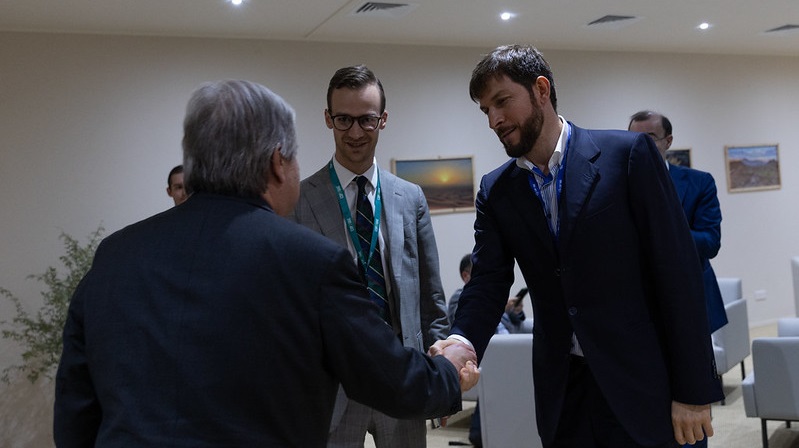With the EU ambivalent and small island states absent, Russia’s call for “transitional fuels” – read gas – made it into the Cop28 agreement
The Russian government’s campaign for endorsement of “transitional fuels” succeeded at the Cop28 climate talks in Dubai.
Russia, the world’s second biggest gas producer, told the United Nations back in February that “natural gas as a transitional fuel… can be used for [emission-cutting] purposes” and this should be recognised at Cop28.
While the final Cop28 agreement does not specifically mention gas, it “recognizes that transitional fuels can play a role in facilitating the energy transition while ensuring energy security”.
It also calls on governments to transition away from fossil fuels in their energy systems so as to achieve net zero by 2050.
Diann Black-Layne from Antigua and Barbuda told the closing meeting of Cop28 that the “transitional fuel” language “is a dangerous loophole”. Coal, oil and gas are all fossil fuels and “we need to transition away from them,” she said.
But Barbados’s climate envoy Avinash Persaud later told Climate Home: “If you actually think about transitioning grids, transition fuels would help to transition with the lowest emissions. You can’t flip a switch and so in the mean time half switch. The challenge is to make sure that the slip road doesn’t become a parking lot.”
Persaud said that “more than a few” countries had supported the language “at some level and at varying degrees”. Another negotiator agreed it “wasn’t just Russia”.
Last-minute addition
Ahead of Cop28, governments and other organisations told a UN panel what they wanted to do to put the world on track to meet its climate goals, in a process known as the global stocktake.
A team of technical experts summarised all the submissions in October. The head of UN climate change, Simon Stiell, called for a “course correction”.
The technical summary included a line which called on governments to “recognise role of natural gas as an efficient transitional fuel”.
At Cop28, a leaked recording heard by Climate Home News shows a Russian negotiator said that ” we suggest emphasising the role of fuels with low-carbon footprint in particular natural gas – that’s transitional fuels and that enables efficient greenhouse gas reductions”.
The UAE Presidency put together an initial 27-page document which included the language which made it into the final text, dropping the mention of gas but referring to “transitional fuels”.
Like many other parts of this document, it included an alternative option of no text. Three days later, after talking to governments, the UAE Presidency dropped it from their next version of the Dubai deal.
With all the attention on the broader issue of fossil fuel phase-out, this language was little noticed or commented on – either in the press or by negotiators.
It stayed off the radar until the scheduled end date for Cop28, 12 December. It appeared in a draft text, according to a source who saw the text, time-stamped 8pm that night.
But some negotiators didn’t see it until the text was published at 7am the following morning. Four hours later, the closing plenary meeting began and within minutes it had been approved.
‘An honest paragraph’
The strongest supporters of anti-fossil fuel language at Cop28 were developed nations, particularly the European Union, and small islands.
But on gas, developed countries did not want
Read More

